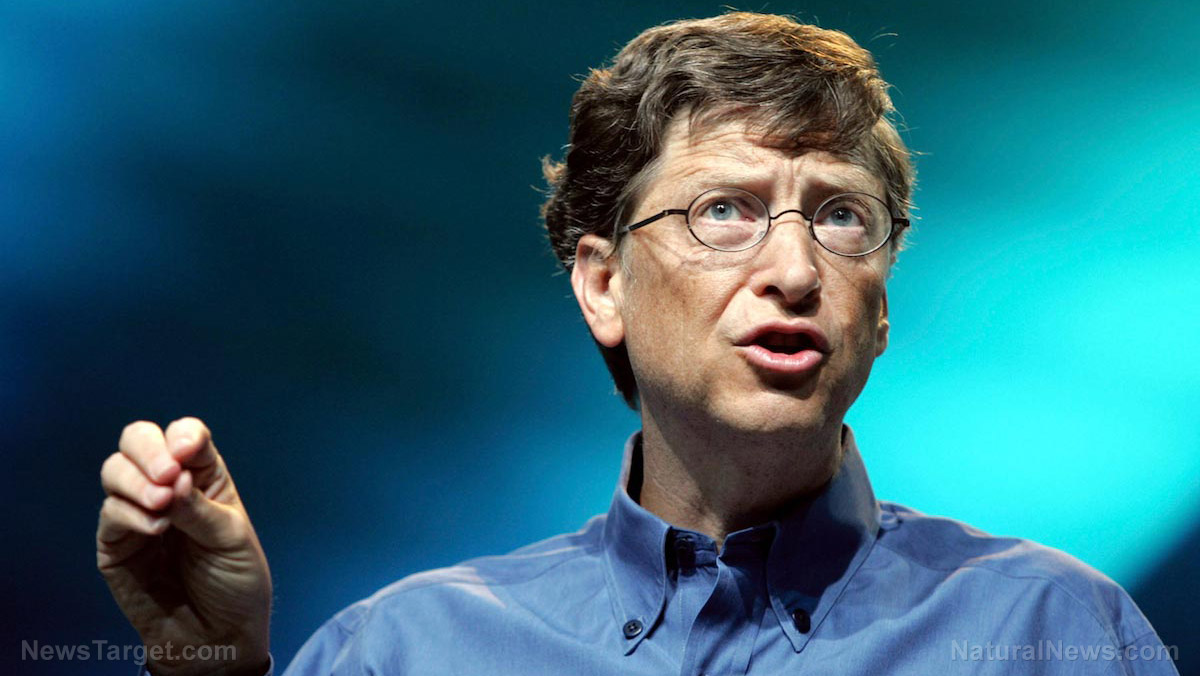Impossible Foods model of monopoly capitalism raises another 200m
Saturday, August 15, 2020 by: News Editors
Tags: bill gates, business, capitalism, covid-19, economy, government, Impossible Foods, monopoly, politics

(Natural News) Food company Impossible Foods is a Bill Gates portfolio startup. For those who have not been following, Bill Gates has been killing it since COVID- literally. His portfolio has ballooned to enormous sums. And while the mainstream media is covering how much his billionaire friends have made – even Mother Jones failed to mention Gates name.
(Article by globalintelhub republished from ZeroHedge.com)
There are a few things that bring the Gates portfolio together; life sciences, genetic engineering, sustainability, and transhumanism. Whether the ‘sustainability’ movement is genuine or an artificially created problem, we will leave for another article. The fact is that events are happening in the real economy that are driving demand for Impossible Foods through the roof. Of course, they are not the only company offering meat alternatives. There is publicly traded Beyond Meat, and private company Just. But Impossible Foods is different in a few ways.
First, their cap table is a who’s who in pop culture.
![]()
If you were going to launch something that was questionably ethical, the most logical and smart thing to do would be to get a bunch of celebrities on board who would sell it to their fans. It’s a genius branding image. Those people on the cap table eat Impossible Foods and promote it.
Also, Impossible Foods employs food scientists that are working on hundreds of food products. But this is not a food company, it’s a save the planet company. That’s because the biggest CO2 emissions come from cows, which feed the American population beefy burgers at your local fat food chain. So their do good business model is to create genetically modified foods that trick the human brain by use of chemical science to think it’s a real burger, and thus change humans diet. It’s the first time that large scale human behaviors are attempted at being changed on a biological level (food).
Biting into an Impossible Burger is to bite into a future in which humanity has to somehow feed an exploding population and not further imperil the planet with ever more livestock. Because livestock, and cows in particular, go through unfathomable amounts of food and water (up to 11,000 gallons a year per cow) and take up vast stretches of land. And their gastrointestinal methane emissions aren’t doing the fight against global warming any favors either (cattle gas makes up 10 percent of greenhouse gas emissions worldwide).
These burgers are not healthy. There are no studies done on the teratogenic effects on these chemicals. They are trying to shift demand in global meat consumption – which will be beneficial for the planet. Their business model was a big question mark – until COVID happened.
Since COVID demand for Impossible Foods has skyrocketed. First, meat factories started closing because workers were catching COVID in the factories.
The government offered to help livestock producers locate contractors skilled in killing herds or flocks of animals and to provide cost-share funding for their disposal because the coronavirus pandemic has shut down packing plants and reduced consumer demand. The National Pork Board held a webinar on Sunday that discussed step by step “emergency depopulation and disposal” of hogs.
Based on traditional economic theory, what happens when supply evaporates? Demand for remaining products goes higher. That’s what’s happening to Impossible Foods. In order to fulfill this demand, Impossible Foods has expanded distribution systems and will even ship product to your home or cafe direct.
Although Impossible Foods is not publicly traded, shares have been increasing in the private markets from the last round $15.5 to as high as $29, and investors still think there is a lot of room to go higher.
In fact, they just raised another $200 Million from a small group of investors:
Impossible Foods has raised $200 million more for its meat replacements. The new round values the company at a Whopper-sized $4 billion valuation, according to the data tracker PrimeUnicorn Index. The new round was led by Coatue, a technology-focused hedge fund; another New York-based hedge fund, XN, also participated in the round. Since its launch the company has raised $1.5 billion from investors, including Mirae Asset Global Investments and Temasek. The presence of these new public/private investment firms on Impossible Foods’ cap table could mean that the company is readying itself for an initial public offering, but that’s just speculation. Impossible previously raised money from investment firms including Horizon Ventures and Khosla Ventures, as well as some of the biggest celebrities in the U.S., like: Jay Brown, Common, Kirk Cousins, Paul George, Peter Jackson, Jay-Z, Mindy Kaling, Trevor Noah, Alexis Ohanian, Kal Penn, Katy Perry, Questlove, Ruby Rose, Phil Rosenthal, Jaden Smith, Serena Williams, will.i.am and Zedd.
It seems like Impossible Foods can do the impossible, and has been built with the Monopoly model in mind. The Monopoly approach to Capitalism doesn’t take risk as an entrepreneur does, they use predetermined outcomes to plan their business. If there is no demand for a product, they create it.
There are rumors they are working on an IPO for next year. There is an expression in Quantum Physics as well as the self-help industry, that describes these companies well:
There are no accidents.
The idea is that an accident is not an accident at all. It’s also called Synchronicity:
Synchronicity is a concept, first introduced by analytical psychologist Carl Jung, which holds that events are “meaningful coincidences” if they occur with no causal relationship yet seem to be meaningfully related.
Another word is Serendipity.
an aptitude for making desirable discoveries by accident.
good fortune; luck:What serendipity—she got the first job she applied for!
If we look deeper at how the Elite operate, their ‘luck’ is actually intelligent planning. For example when Microsoft was a garage company, it was Bill Gates parents who helped him secure the lucrative contract with IBM, you know – the one that made Microsoft the largest software company in the world:
Bill Gates’ mom, Mary Gates, helped her son form a lucrative relationship with I.B.M., securing a contract with his fledgling company, Microsoft, according to the New York Times.
Predetermined outcomes drive Monopoly Capitalism. Imagine, a business without risk. It’s better than finance! Their business and political agenda is well thought out, well funded, well researched by think tanks, corporate consultants, advisors, lawyers, and experts. The investors and others involved, such as Temasek, are some of the largest and most powerful people in the world. Temasek is the sovereign wealth fund of the Singapore Government, that manages about $333 Billion. Li Ka-Shing is Asia’s richest man. Viking Global is one of the largest hedge funds in the world (at $33 Billion). UBS is one of the largest banks in the world. These are all systemically important investors, who don’t like taking risks.
All of these are compelling reasons to invest in Impossible Foods, of course there are no guarantees and anything is possible. Investing in Private Markets is for accredited investors only, and is highly risky. Also, if there was a problem with the company, liquidity would drop to zero (like it did with WeWork). Those are the risks. On the other hand, Private Equity is where Bill Gates and others actually made their wealth – through the stock of their startups which grew into behemoths. For those who have never encountered this here’s a quick economic explanation.
Starting a new enterprise is extremely risky. They say that 9 out of 10 companies fail, but the number is probably 99 out of 100 that fail. But the 1 that succeeds, can potentially win big such as Google, Microsoft, Amazon, etc. Stories about people like Bill Gates are portrayed as misleading, they allow people to think that ‘anyone can do it’ which statistically is a true and correct statement. The reality is if you graduate from Stanford or Princeton the chances of you becoming the next Bill Gates are infinitely higher than any other timeline. From start to maturity, take a look at this chart:
![]()
Recently you may have heard about “Unicorns” which are simply billion dollar private companies. Another term that’s been coined is “Pre IPO” which means basically companies that are so big, they should be public, but they are not. Private Equity deals with the full spectrum until a company is public. Now look at this risk chart:
![]()
Basically, as a company becomes older, it becomes less risky, and the potential ROI also declines. Take the example of a startup. In a seed stage investment, you can lose 100% of your money, or potentially make 3,000% returns. If you invest in Palantir, which is going to IPO soon, you can potentially lose 100% of youARMING peoples' health!!!!r money but chances are your losses are limited because Palantir has such a good reputation, it’s almost a ‘blue chip’ private company. Remember we are comparing Palantir to a startup, not to publicly traded blue chips. The potential return for investors on Palantir is comparatively low, they may be happy with a 50% return or 2x. But they are happy to get a smaller return for smaller risk. This function is a metaphor to explain what happens to companies over time, it doesn’t mean that all companies fall into a simple linear model. Each company needs to be evaluated for its own risks and benefits.
Read more at : ZeroHedge.com and Risk.news.
These evil people are making huge PROFITS and at the SAME time HARMING peoples' Health!!!




No comments:
Post a Comment